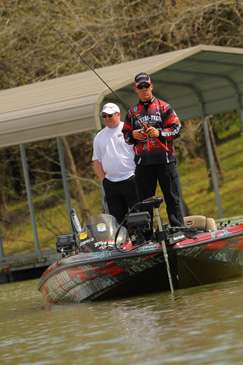
Spinnerbaits are versatile. They can be pulled through the worst trash or through open water. They can be fished shallow, deep or at any depth in between. They can be effective in any water color, day or night.
In spite of this versatility, many fishermen regard spinnerbaits as seasonal tools and stow them away when the water temperatures drop. Brent Chapman, veteran Elite Series angler and nine-time Classic qualifier, begs to differ.
"There are times," says Brent, "especially in colder water, when a spinnerbait is what the bass want. It'll catch more and bigger fish. In my experience, there's not a better time to catch them on spinnerbaits than in late fall and early winter. The bass will soon get sluggish, but right now they're saying, 'Winter's coming and I need to eat!' The bigger bass tend to key in on bigger baitfish, and a spinnerbait fits that bill."
Chapman uses a spinnerbait until the surface temperature reaches the mid to low 40s.
As far as when to throw a spinnerbait, Brent believes, "It's a bait you have to experiment with. I often use it as a search bait, and I've been shocked at how aggressive bass can be in cooler water. But cold water bass can also be finicky about a spinnerbait. One day they'll be shallow and eating it real good. The next day, they'll be deep and want to be finessed by slow rolling it."
It's important to be familiar with different spinnerbait presentations to fool a chilly bass.
In clear water, Chapman often burns the bait back to the boat.
"Burning it," he says, "gives the bass less time to see the bait. They'll strike by instinct. I usually use a fast retrieve around docks and for bass suspending above standing timber. If they want it, they'll come up and get it."
In other situations, the bass may want a slower presentation.
Brent explains that in deep water or around steep banks, he'll slow roll the bait. By casting well past his target and keeping an eye on his line for a subtle strike on the fall, he waits for the bait to reach bottom. Once there, he keeps the blades barely spinning while maintaining bottom contact.
"The blades," he explains, "are especially important in cool water. I often use a 1/2-ounce or 1-ounce Terminator T-1 with tandem willow blades. At other times, when big bass are eating big baitfish, it's vital to use big blades. A No. 5 or No. 7 Colorado blade on a Terminator spinnerbait will give you a lot of thump and really pull the fish up. In stained or dirty water, I use a big Colorado in tandem with an Oklahoma blade."
Chapman states that he's not too particular regarding skirt color. His favorites are chartreuse and white. Chartreuse for sunny days and white for cloudy skies. In either case, he prefers a translucent skirt in clear water to tone down the colors of the bait.
"My preference as far as rods is pretty simple, too. I love the Wright & McGill Skeet Reese Tessera rods. A great rod for spinnerbaits is a 6 1/2 or 7 foot medium heavy rod. That length and action give you good control and better casting distance. As far as reels go, my minimum reel speed is 6:4:1. That usually provides plenty of room to work the bait fast or slow."
Unless there is very thick cover, the pro spools on 20-pound Gamma fluorocarbon line for cold water spinnerbait fishing. "I believe in its strength and abrasion resistance." he explains. "In really bad trash, however, I'll switch to braid."
"Once you've got the bait, equipment and technique down, there's no reason not to try a spinnerbait in cold water. But, there is one thing that's very important — always use a trailer hook, especially in tournaments! We all may bring in 9 out of 10 bass without a trailer hook, but it's that last one that can make or break a tournament weight."




